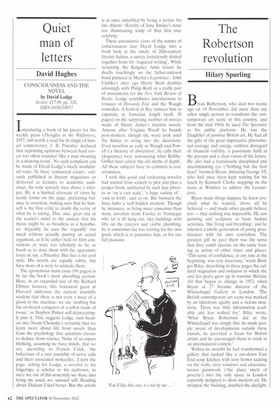Quiet man of letters
David Hughes
CONSCIOUSNESS AND THE NOVEL by David Lodge Seeker, £17.99, pp, 320. ISBN 0436210053 Introducing a book of his pieces for the weekly press (Thoughts in the Wilderness, 1957, still worth a read for its tingle of honest controversy), J. B. Priestley declared that reprinting opinions between hard covers too often sounded 'like a man shouting in a drawing-room'. No such complaint can be made of David Lodge's nicely modulated voice. In these 'connected essays', variously published in literary magazines or delivered as lectures to academic audiences, his tone scarcely rises above a whisper. He is a hushed advocate of views he neatly forms on the page, preferring balance to assertion, making sure that he himself is the first critic to doubt the verity of what he is saying. This, alas, gives rise in the reader's mind to the anxiety that his thesis might be as bloodless as a hypothesis. Arguably, he uses the 'arguably' too much without actually putting an actual argument, as if he either held no firm convictions or were too scholarly to be so brash as to state them with the egocentric force of, say, a Priestley. But that is his cool style. His novels are equally subtle, but have more of a story to animate them.
The eponymous main essay (90 pages) is by far the book's most absorbing section. Here, in an expanded text of the Richard Ellman lectures, this honoured guest at Harvard addresses the current scientific wisdom that there is not even a trace of a ghost in the machine: we are 'nothing but the on-board computer of a robot made of tissue,' as Stephen Pinker self-deprecatingly puts it. This, suggests Lodge, runs headon into Noam Chomsky's certainty that we learn more about life from novels than from the psychology that scientists choose to deduce from science. None of us enjoys thinking, assuming we have minds, that we are, according to Francis Crick, 'the behaviour of a vast assembly of nerve cells and their associated molecules'. I turn the page, aching for Lodge, a novelist to his fingertips, a scholar to his eyebrows, to steer me out of this nonentity we share into being my usual, no, unusual self. Reading about Dickens I feel better. But the article is at once enfeebled by being a review for the Atlantic Monthly of Jane Smiley's none too illuminating study of that first true celebrity.
These unromantic views of the nature of consciousness lure David Lodge into a fresh look at the whole of 20th-century literary fiction, a survey fortuitously slotted together from his 'required writing'. While reviewing the Kingsley Amis letters he dwells touchingly on the father-and-son bond pictured in Martin's Experience. John Updike's alter ego Henry Bech doubles amusingly with Philip Roth in a crafty pair of assessments for the New York Review of Books. Lodge contributes introductions to reissues of Howards End and the Waugh comedies. A festival at Rye induces him to expatiate at Jamesian length (well, 30 pages) on the surprising number of movies made of Henry James's inactive novels. Anyone after Virginia Woolf he brands post-modern, though the word took until the Sixties to swing into the dictionary. Even novelists as early as Waugh and Powell (a rhetoric of abstention', he calls their eloquence) were renouncing what RobbeGrillet later called 'the old myths of depth'. All these subjects have in common is consciousness.
I wish this good and endearing novelist had started from scratch to plot and plan a proper book, unlittered by such lazy phrases as 'on a vast scale', 'a huge variety of' , 'and so forth-, and so on. But between the lines lurks a well-hidden memoir. Though he instances, as being more conscious than most, novelists from Fowles to Vonnegut who let it all hang out, like buildings with lifts on the exterior and visible plumbing, he is sometimes far too retiring for his own good, which is to patronise him, or for our full pleasure.


























































































 Previous page
Previous page